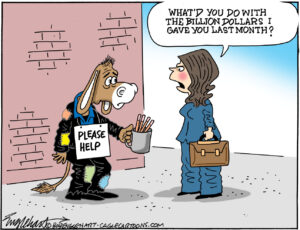Maliki Doesn’t Deserve All the Blame
Maybe the Iraqi prime minister should just enter our primaries next year and Americans could vote up or down on whether he should remain in office.WASHINGTON — Maybe Iraqi Prime Minister Nouri al-Maliki should just enter our primaries next year and Americans could vote up or down on whether he should remain in office.
The surest sign of how bad our choices in Iraq have become is the eagerness of both of our political parties to blame the entire mess on the man American officials helped install in his job. After all, it was taken as an American victory back in April 2006 when Maliki replaced former Prime Minister Ibrahim al-Jafari, who faced many of the same criticisms Maliki does today.
Now, Maliki is the problem. Among Democrats, both Sens. Carl Levin and Hillary Clinton have called for replacing him with “a less divisive and more unifying figure,” as Clinton put it.
On consecutive days, President Bush was against Maliki before he was for him. On Tuesday, he suggested that Iraqi disappointment with Maliki might lead to his ouster. “If the government doesn’t respond to the demands of the people,” Bush said of the Iraqis, “they will replace the government.”
On Wednesday, he declared that Maliki was “a good guy, a good man with a difficult job” and added: “I support him.” Who knows what the administration’s position on Maliki will be by the weekend?
Maliki has done a less than stellar job, but it’s absurd to place all the blame on him for the failure of a political process that American policies set in motion. Nor can he be faulted for the administration’s lack of foresight — before we started this war — in anticipating how difficult it would be to achieve reconciliation between the Sunnis and the Shiites.
Bush compared Iraq to Vietnam this week, and there is at least one area in which the metaphor is instructive: When we failed to achieve our objectives in Indochina, we kept hoping that a new South Vietnamese government would solve our problems for us. But our repeated interventions in Saigon’s politics did not improve the situation — and arguably made it worse.
It’s no accident that American politicians find themselves inveigled in Iraqi politics. The president’s troop surge was designed not to achieve some decisive military result but to bring about a political result — to give Iraqis “breathing room” to settle their sectarian differences.
That’s why both sides in the war debate are talking past each other. Supporters of the administration point to signs of military success and insist that we should keep at it. The administration’s opponents don’t deny some military gains — at considerable cost in American lives. But they argue that the continuing political disarray in Iraq shows that the surge has failed to achieve its primary objective and that we should begin to disentangle our troops from a civil war.
The debate as it’s currently configured puts a much higher short-term political burden on congressional Democrats than Republicans. The president has the easier political objective: He needs only to block congressional action that would force him to alter his policy. As long as most Republicans stick with him, he wins.
Democrats, on the other hand, are in a classic damned-if-they-do, damned-if-they-don’t situation. On Thursday, for example, House Democrats held a private conference call discussing whether they should push a proposal by Reps. Neil Abercrombie of Hawaii and John Tanner of Tennessee that would require the Pentagon to produce a plan for redeployment of American troops.
The Abercrombie-Tanner measure would likely win more Republican votes than a proposal to force a troop withdrawal. As one House Democrat noted, this might increase pressure on Bush to change course and would, in any event, show that Democrats are seeking a bipartisan way out of Iraq.
But as a top Democratic congressional aide noted, allowing such a vote could anger the party’s large antiwar constituency, who would see it as a half-way measure, and still not force Bush to change policy. In this view, allowing votes on moderate withdrawal proposals might actually reduce pressure on Bush to shift course in Iraq by making it unnecessary for congressional Republicans to support tougher withdrawal plans.
The sad fact is that this war has created stasis in American politics. If Bush doesn’t budge, he is likely to be able to continue his approach — even if a majority of the country has turned against it, and even if there is no political reconciliation in Iraq.
No wonder our politicians find it so attractive to trash Maliki. He has become the punching bag for American failures. But come 2008, if things don’t get better in Iraq, it is Bush’s policies, not Maliki’s, that American voters will judge.
E.J. Dionne’s e-mail address is postchat(at)aol.com.
© 2007, Washington Post Writers Group
Your support is crucial…With an uncertain future and a new administration casting doubt on press freedoms, the danger is clear: The truth is at risk.
Now is the time to give. Your tax-deductible support allows us to dig deeper, delivering fearless investigative reporting and analysis that exposes what’s really happening — without compromise.
Stand with our courageous journalists. Donate today to protect a free press, uphold democracy and unearth untold stories.









You need to be a supporter to comment.
There are currently no responses to this article.
Be the first to respond.